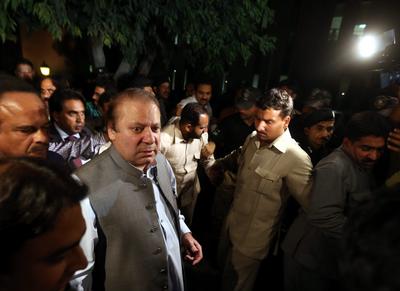Hangings, dismissals, coups d’etat and assassination of leaders have accompanied all of Pakistan’s previous elections.
Sharif deserves credit for patiently waiting for five years despite taunts of ‘friendly opposition’, when he could have easily joined others to topple the Zardari-led government — arguably the most inept and corrupt in Pakistan’s history.
Reflecting its consistent stance against US drones and calling for disengagement from the US-led war, Imran Khan’s Pakistan Tehreek-e-Insaaf (PTI) swept the national and provincial assembly polls in the Khyber Pakhtunkhwa and made some inroads into Sharif strongholds in Punjab. Khan’s campaign against corruption partly energised people to vote.
Other partners in the previous coalition were largely voted out from the assemblies.
By removing the whole family of former Prime Minister Yousuf Raza Gilani and the Pakistan People’s Party (PPP) from Southern Punjab the voters rejected the idea of dividing Punjab into smaller units. From 27 in the last assembly the PPP could only win one seat in the area this time.
The success of the media’s role in bringing forth Pakistanis to vote was shown through the over-60 per cent reported turn out, rising from a measly 44 per cent in 2008.
Pakistan’s elections this time were held in the backdrop of a failing economy, debilitating power cuts, widespread corruption at the highest levels, militancy within, and the unpopular partnership with the United States over the ‘war on terrorism’.
Notwithstanding total mismanagement by the PPP regime, PML-N’s electoral success is largely due to the performance of the Government of Punjab, led by Sharif’s brother Shahbaz Sharif. The younger Sharif, with a reputation of getting things done, delivered several projects on time and faces no corruption charges.
Himself a business tycoon, Nawaz Sharif’s two previous terms as prime minister raises business confidence. The Karachi Stock Exchange 100 index crossed 20,000 points for the first time in history within the first session of trading the day markets opened after Sharif’s victory.
‘You see privatisation, free market economy, deregulation — they have been hallmarks of our party in government. We are going to pick up the threads from where we left off’, said Nawaz Sharif following his triumph. Yet making the tax-evading business community pay taxes to bridge the resource gap is not going to be easy.
Sharif has said he could work with the IMF to put the economy back on track. The usual IMF recipe accompanied by cutting subsidies will be too much for the hard-pressed common man. ‘We need stabilisation with growth … all we need from the IMF is a little more time to pay back $5 billion that we owe them’, said Sartaj Aziz, Sharif’s two-time Finance Minister who drafted the Party’s election manifesto.
In foreign policy Sharif faces three to four immediate challenges. Finding a balance in relations with India is an urgent task, where Sharif will need to increase the momentum set by the previous government. Setting the tone during the ‘long chat’ with Prime Minister Manmohan Singh, both invited the other to visit their respective countries. There is perhaps no better time for Pakistan and India to move forward.
With PML-N and PTI calling for the end of drone strikes, defining new terms of engagement with Washington poses the big challenge. Any perception like the PPP policy of publically opposing and privately condoning drone attacks will shorten Sharif’s honeymoon with the people, something he is unlikely to risk. It is now for the United States to respect the expressed wishes of the Pakistani people.
The Saudis and Gulf Cooperation Council countries felt somewhat cut off during the previous regime, which they suspected was cozier with Iran. Balancing these relations between the two opposing sides will pose its own dilemma for the incoming government.
Amongst the challenges Sharif faces is his relations with the military. Earlier in power these relations soured to a point of his ouster by Musharraf in 1999. A visibly chastened Nawaz Sharif has played down prospects of conflict with the military, which under General Kayani has no proclivity to interfere in civilian affairs. This will be tested when the military’s interests over vital elements of foreign and security policy are reconciled with civilian control.
Having used their votes decisively, Pakistanis feel Sharif is the harbinger of change for the better. This resounding win means that he is independent of smaller parties for forming government and will have fewer excuses in case of failure.
With many hard decisions expected, Nawaz Sharif will need wisdom, support and luck to revive the sagging economy, balance foreign policy interests and fulfill the people’s expectations.
Sajjad Ashraf currently an adjunct professor at the Lee Kuan Yew School of Public Policy, National University of Singapore and a visiting senior research fellow at the Institute of Southeast Asian Studies, Singapore is a former member of Pakistan’s Foreign Service.

